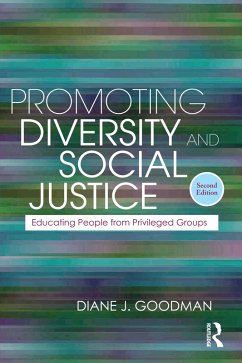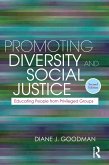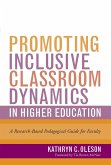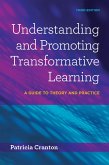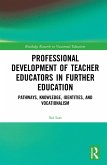Diane J. Goodman
Promoting Diversity and Social Justice (eBook, PDF)
Educating People from Privileged Groups, Second Edition
46,95 €
46,95 €
inkl. MwSt.
Sofort per Download lieferbar

23 °P sammeln
46,95 €
Als Download kaufen

46,95 €
inkl. MwSt.
Sofort per Download lieferbar

23 °P sammeln
Jetzt verschenken
Alle Infos zum eBook verschenken
46,95 €
inkl. MwSt.
Sofort per Download lieferbar
Alle Infos zum eBook verschenken

23 °P sammeln
Diane J. Goodman
Promoting Diversity and Social Justice (eBook, PDF)
Educating People from Privileged Groups, Second Edition
- Format: PDF
- Merkliste
- Auf die Merkliste
- Bewerten Bewerten
- Teilen
- Produkt teilen
- Produkterinnerung
- Produkterinnerung

Bitte loggen Sie sich zunächst in Ihr Kundenkonto ein oder registrieren Sie sich bei
bücher.de, um das eBook-Abo tolino select nutzen zu können.
Hier können Sie sich einloggen
Hier können Sie sich einloggen
Sie sind bereits eingeloggt. Klicken Sie auf 2. tolino select Abo, um fortzufahren.

Bitte loggen Sie sich zunächst in Ihr Kundenkonto ein oder registrieren Sie sich bei bücher.de, um das eBook-Abo tolino select nutzen zu können.
Promoting Diversity and Social Justice gives theory, perspectives, and strategies that are useful for working with adults from privileged groups on diversity and social justice issues.
- Geräte: PC
- mit Kopierschutz
- eBook Hilfe
- Größe: 1.34MB
Andere Kunden interessierten sich auch für
![Promoting Diversity and Social Justice (eBook, ePUB) Promoting Diversity and Social Justice (eBook, ePUB)]() Diane J. GoodmanPromoting Diversity and Social Justice (eBook, ePUB)46,95 €
Diane J. GoodmanPromoting Diversity and Social Justice (eBook, ePUB)46,95 €![Promoting Inclusive Classroom Dynamics in Higher Education (eBook, PDF) Promoting Inclusive Classroom Dynamics in Higher Education (eBook, PDF)]() Kathryn C. OlesonPromoting Inclusive Classroom Dynamics in Higher Education (eBook, PDF)31,95 €
Kathryn C. OlesonPromoting Inclusive Classroom Dynamics in Higher Education (eBook, PDF)31,95 €![Strategies for Writing a Thesis by Publication in the Social Sciences and Humanities (eBook, PDF) Strategies for Writing a Thesis by Publication in the Social Sciences and Humanities (eBook, PDF)]() Lynn P. NygaardStrategies for Writing a Thesis by Publication in the Social Sciences and Humanities (eBook, PDF)21,95 €
Lynn P. NygaardStrategies for Writing a Thesis by Publication in the Social Sciences and Humanities (eBook, PDF)21,95 €![Training Teachers in Emotional Intelligence (eBook, PDF) Training Teachers in Emotional Intelligence (eBook, PDF)]() Elena SavinaTraining Teachers in Emotional Intelligence (eBook, PDF)40,95 €
Elena SavinaTraining Teachers in Emotional Intelligence (eBook, PDF)40,95 €![Understanding and Promoting Transformative Learning (eBook, PDF) Understanding and Promoting Transformative Learning (eBook, PDF)]() Patricia CrantonUnderstanding and Promoting Transformative Learning (eBook, PDF)33,95 €
Patricia CrantonUnderstanding and Promoting Transformative Learning (eBook, PDF)33,95 €![Professional Development of Teacher Educators in Further Education (eBook, PDF) Professional Development of Teacher Educators in Further Education (eBook, PDF)]() Sai LooProfessional Development of Teacher Educators in Further Education (eBook, PDF)40,95 €
Sai LooProfessional Development of Teacher Educators in Further Education (eBook, PDF)40,95 €![Small Group Teaching (eBook, PDF) Small Group Teaching (eBook, PDF)]() Kate ExleySmall Group Teaching (eBook, PDF)29,95 €
Kate ExleySmall Group Teaching (eBook, PDF)29,95 €-
-
-
Promoting Diversity and Social Justice gives theory, perspectives, and strategies that are useful for working with adults from privileged groups on diversity and social justice issues.
Dieser Download kann aus rechtlichen Gründen nur mit Rechnungsadresse in A, B, BG, CY, CZ, D, DK, EW, E, FIN, F, GR, HR, H, IRL, I, LT, L, LR, M, NL, PL, P, R, S, SLO, SK ausgeliefert werden.
Produktdetails
- Produktdetails
- Verlag: Taylor & Francis eBooks
- Seitenzahl: 232
- Erscheinungstermin: 15. Mai 2011
- Englisch
- ISBN-13: 9781136817403
- Artikelnr.: 38278644
- Verlag: Taylor & Francis eBooks
- Seitenzahl: 232
- Erscheinungstermin: 15. Mai 2011
- Englisch
- ISBN-13: 9781136817403
- Artikelnr.: 38278644
- Herstellerkennzeichnung Die Herstellerinformationen sind derzeit nicht verfügbar.
Diane J. Goodman, Ed.D., is a trainer, college teacher, author, speaker, and consultant on diversity and social justice issues. For more information, see her website: http://www.dianegoodman.com.
Chapter 1: Introduction
* Update oppression chart: add gender oppression; change
"Anti-Semitism" to "Anti-Semitism and religious oppression" and list
other religious minorities; discuss "border identities" (Adams, Bell
and Griffin)
* New graphic to depict the intersectionality of our identities
Chapter 2: About Privileged Groups
* Update statistics
* Elaborate discussion of characteristics of privileged groups and
individuals
Chapter 3: Perspectives on Individual Change and Development
* p. 51- correct typo, change multiplicity or subjective to
relativism/procedural
* Update social identity models
Chapter 4: Understanding Resistance
* Add to reasons for resistance
Chapter 5: Preventing and Reducing Resistance
* Refine chart on intervention strategies
Chapter 6: The Costs of Oppression to People from Privileged Groups
* Add to costs of oppression
Chapter 7: The Joy of Unlearning Racism and the Benefits of Social Justice
* New chapter. Describe the psychological, intellectual, interpersonal,
spiritual, professional and other benefits white people experience
when they have worked to unlearn racism.
* Address the similarities to and relevance for unlearning other forms
of oppression as a member of the privileged group
* Move section on Benefits of Social Justice (p. 198-202) from current
Chapter 10 to this chapter. Expand this section.
Chapter 8: Why People from Privileged Groups Support Social Justice
Chapter 9: Developing and Enlisting Support for Social Justice
* Move revised versions of the sections "Shifting the Paradigm" and
"The Appeal of Partnership Relations and Social Justice to People
from Privileged Groups" (pp. 190-198) from current Chapter 10 to end
of this chapter.
Chapter 10: Allies and Action
* New Chapter. Discuss options for action, blocks to action,
accountability, what it means to be an ally, challenges of being an
ally, and particular issues for white men.
* Incorporate section on "From Motivation to Action: Allies and
Activism" (p. 163-167) in current Chapter 8 and section on "The Need
for Both Individual and Societal Change" from Chapter. 10.
Chapter 11: Issues for Educators
* Add greater discussion of the differences for educators from dominant
or subordinate groups
* Add more about dealing with triggers
* Discuss "mindful facilitation" (Lee Mun Wah)
* Update oppression chart: add gender oppression; change
"Anti-Semitism" to "Anti-Semitism and religious oppression" and list
other religious minorities; discuss "border identities" (Adams, Bell
and Griffin)
* New graphic to depict the intersectionality of our identities
Chapter 2: About Privileged Groups
* Update statistics
* Elaborate discussion of characteristics of privileged groups and
individuals
Chapter 3: Perspectives on Individual Change and Development
* p. 51- correct typo, change multiplicity or subjective to
relativism/procedural
* Update social identity models
Chapter 4: Understanding Resistance
* Add to reasons for resistance
Chapter 5: Preventing and Reducing Resistance
* Refine chart on intervention strategies
Chapter 6: The Costs of Oppression to People from Privileged Groups
* Add to costs of oppression
Chapter 7: The Joy of Unlearning Racism and the Benefits of Social Justice
* New chapter. Describe the psychological, intellectual, interpersonal,
spiritual, professional and other benefits white people experience
when they have worked to unlearn racism.
* Address the similarities to and relevance for unlearning other forms
of oppression as a member of the privileged group
* Move section on Benefits of Social Justice (p. 198-202) from current
Chapter 10 to this chapter. Expand this section.
Chapter 8: Why People from Privileged Groups Support Social Justice
Chapter 9: Developing and Enlisting Support for Social Justice
* Move revised versions of the sections "Shifting the Paradigm" and
"The Appeal of Partnership Relations and Social Justice to People
from Privileged Groups" (pp. 190-198) from current Chapter 10 to end
of this chapter.
Chapter 10: Allies and Action
* New Chapter. Discuss options for action, blocks to action,
accountability, what it means to be an ally, challenges of being an
ally, and particular issues for white men.
* Incorporate section on "From Motivation to Action: Allies and
Activism" (p. 163-167) in current Chapter 8 and section on "The Need
for Both Individual and Societal Change" from Chapter. 10.
Chapter 11: Issues for Educators
* Add greater discussion of the differences for educators from dominant
or subordinate groups
* Add more about dealing with triggers
* Discuss "mindful facilitation" (Lee Mun Wah)
Chapter 1: Introduction
* Update oppression chart: add gender oppression; change
"Anti-Semitism" to "Anti-Semitism and religious oppression" and list
other religious minorities; discuss "border identities" (Adams, Bell
and Griffin)
* New graphic to depict the intersectionality of our identities
Chapter 2: About Privileged Groups
* Update statistics
* Elaborate discussion of characteristics of privileged groups and
individuals
Chapter 3: Perspectives on Individual Change and Development
* p. 51- correct typo, change multiplicity or subjective to
relativism/procedural
* Update social identity models
Chapter 4: Understanding Resistance
* Add to reasons for resistance
Chapter 5: Preventing and Reducing Resistance
* Refine chart on intervention strategies
Chapter 6: The Costs of Oppression to People from Privileged Groups
* Add to costs of oppression
Chapter 7: The Joy of Unlearning Racism and the Benefits of Social Justice
* New chapter. Describe the psychological, intellectual, interpersonal,
spiritual, professional and other benefits white people experience
when they have worked to unlearn racism.
* Address the similarities to and relevance for unlearning other forms
of oppression as a member of the privileged group
* Move section on Benefits of Social Justice (p. 198-202) from current
Chapter 10 to this chapter. Expand this section.
Chapter 8: Why People from Privileged Groups Support Social Justice
Chapter 9: Developing and Enlisting Support for Social Justice
* Move revised versions of the sections "Shifting the Paradigm" and
"The Appeal of Partnership Relations and Social Justice to People
from Privileged Groups" (pp. 190-198) from current Chapter 10 to end
of this chapter.
Chapter 10: Allies and Action
* New Chapter. Discuss options for action, blocks to action,
accountability, what it means to be an ally, challenges of being an
ally, and particular issues for white men.
* Incorporate section on "From Motivation to Action: Allies and
Activism" (p. 163-167) in current Chapter 8 and section on "The Need
for Both Individual and Societal Change" from Chapter. 10.
Chapter 11: Issues for Educators
* Add greater discussion of the differences for educators from dominant
or subordinate groups
* Add more about dealing with triggers
* Discuss "mindful facilitation" (Lee Mun Wah)
* Update oppression chart: add gender oppression; change
"Anti-Semitism" to "Anti-Semitism and religious oppression" and list
other religious minorities; discuss "border identities" (Adams, Bell
and Griffin)
* New graphic to depict the intersectionality of our identities
Chapter 2: About Privileged Groups
* Update statistics
* Elaborate discussion of characteristics of privileged groups and
individuals
Chapter 3: Perspectives on Individual Change and Development
* p. 51- correct typo, change multiplicity or subjective to
relativism/procedural
* Update social identity models
Chapter 4: Understanding Resistance
* Add to reasons for resistance
Chapter 5: Preventing and Reducing Resistance
* Refine chart on intervention strategies
Chapter 6: The Costs of Oppression to People from Privileged Groups
* Add to costs of oppression
Chapter 7: The Joy of Unlearning Racism and the Benefits of Social Justice
* New chapter. Describe the psychological, intellectual, interpersonal,
spiritual, professional and other benefits white people experience
when they have worked to unlearn racism.
* Address the similarities to and relevance for unlearning other forms
of oppression as a member of the privileged group
* Move section on Benefits of Social Justice (p. 198-202) from current
Chapter 10 to this chapter. Expand this section.
Chapter 8: Why People from Privileged Groups Support Social Justice
Chapter 9: Developing and Enlisting Support for Social Justice
* Move revised versions of the sections "Shifting the Paradigm" and
"The Appeal of Partnership Relations and Social Justice to People
from Privileged Groups" (pp. 190-198) from current Chapter 10 to end
of this chapter.
Chapter 10: Allies and Action
* New Chapter. Discuss options for action, blocks to action,
accountability, what it means to be an ally, challenges of being an
ally, and particular issues for white men.
* Incorporate section on "From Motivation to Action: Allies and
Activism" (p. 163-167) in current Chapter 8 and section on "The Need
for Both Individual and Societal Change" from Chapter. 10.
Chapter 11: Issues for Educators
* Add greater discussion of the differences for educators from dominant
or subordinate groups
* Add more about dealing with triggers
* Discuss "mindful facilitation" (Lee Mun Wah)
